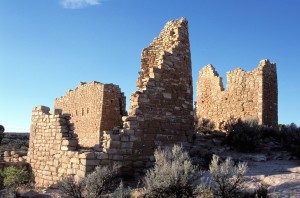 It’s hard to put the Blanding, Utah, looting and antiquities trafficking case in perspective. Here are the bare numbers: some $336,000 spent by an informant to acquire artifacts during an investigation that lasted more than two years; two dozen people arrested, most from Blanding and half in their 60s and 70s; and two suicides.
It’s hard to put the Blanding, Utah, looting and antiquities trafficking case in perspective. Here are the bare numbers: some $336,000 spent by an informant to acquire artifacts during an investigation that lasted more than two years; two dozen people arrested, most from Blanding and half in their 60s and 70s; and two suicides.
On September 16, U.S. District Court Judge Clark Waddoups sentenced the first two defendants to be convicted. Jeanne Redd was given 36 month’s probation and must pay a $2,000 fine after pleading guilty to felonies involving the Archaeological Resources Protection Act and theft of government and Native American tribal property. Her daughter, Jericca, received 24 months’ probation and a $300 fine for digging up artifacts on a Navajo reservation. The judge was lenient—prosecutors had asked for stiffer sentences, including jail time for Jeanne. But one of those who took their own life after being indicted was James Redd (60), Jeanne’s husband and a well-known family doctor in this town of about 4,000 people.
Raids by federal law enforcement agents on June 10th brought the investigation into the light and set off a storm of anger and resentment. The mayor and residents of Blanding complained at the number of agents, drawn guns, and arrests in front of family members. James Redd’s death the day after the raids, an unpredictable and tragic outcome, made it worse. Some likened the agents to the Gestapo.
Archaeologist Winston Hurst, a native and resident of Blanding, described the town’s longstanding culture of pot hunting in “The Looters Next Door.†The practice is so ingrained that many locals view it as a right, despite the laws. But Hurst also faults the federals agents for their handling of the matter, “They go in with half a dozen guys, with automatic weapons, flak jackets, and black FBI suits and not only arrest them, but put them in leg chains and handcuffs. It’s nothing but theater.†Hurst contends that such arrests are high profile, but ineffective. “The thing is it’s hard to measure the outcomes of fuzzy things like educational programs,†he says. “If these people want to protect the archaeology, they will, if they want to tear it up, they will. Sending in divisions of law enforcement won’t make a difference. It’s all about hearts and minds.â€
But crimes were committed. Taking artifacts from public lands—stealing public property—is not so different than stealing a car and then saying it’s okay because the owner wasn’t there at the time. Archaeological sites on public lands belong to all of us. Those on tribal lands are under the tribe’s jurisdiction. The Redds knew the laws, having been prosecuted in the 1990s for digging on state lands.
It seems from the press reports that those indicted are not violent felons and not involved with guns and drugs, which can go and-in-hand with some young pot hunters (see “The Case of the Missing Buffalo Soldier†and “Drugs, Guns, and Dirtâ€). While that may suggest the raids were overdone, as Hurst says, it doesn’t get them off the hook. As far as the destruction of sites goes, motive doesn’t matter, whether it’s “old boys†out doing what they’ve done all their lives or younger people looking for artifacts to sell for cash to buy crystal meth with. And, given the informant was able to spend all that money, this clearly wasn’t just a retirement hobby for those involved. The Salt Lake Tribune added a moral point in an editorial that took a dim view of what it called the judge’s “misplaced mercy.†Some of his lenience, it said, was in part because of the local pot hunting culture is longstanding, even though it is a culture that “flouts the law by uprooting and selling off the relics of another, older culture that its descendants to this day consider sacred.â€
I think Hurst is right about education being the right approach for effecting change. At the same time, laws have to be enforced, but in a consistent and sensitive way.
This entry was posted by Mark Rose on
Friday, October 9, 2009.
Discussion of this blog entry is now closed.
Comments posted here do not represent the views or policies of the Archaeological Institute of America.

